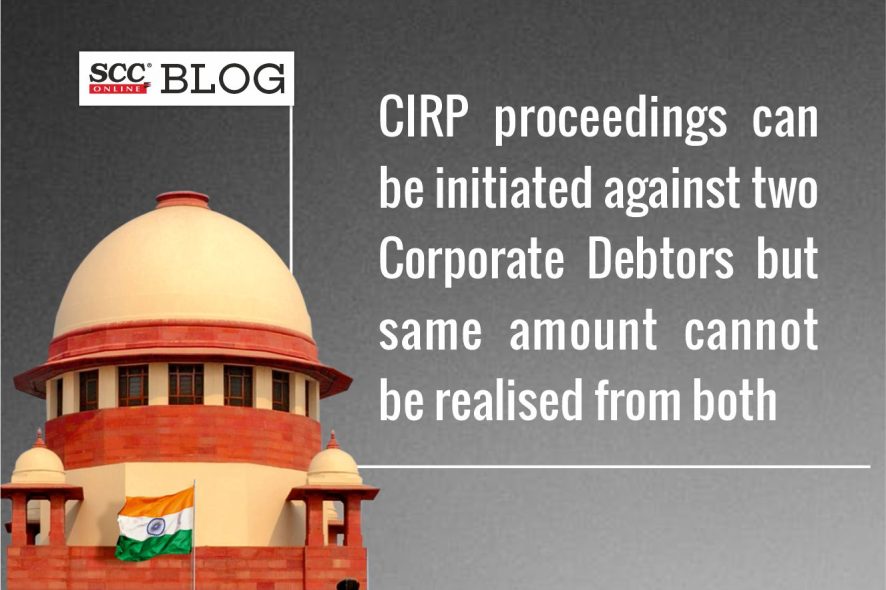Supreme Court: The bench of Indira Banerjee* and JK Maheshwari, JJ has held that if there are two borrowers or if two corporate bodies fall within the ambit of corporate debtors, there is no reason why proceedings under Section 7 of the Insolvency and Bankruptcy Code, 2016 (IBC) cannot be initiated against both the Corporate Debtors.
The Court, however, clarified that the same amount cannot be realised from both the Corporate Debtors.
“If the dues are realised in part from one Corporate Debtor, the balance may be realised from the other Corporate Debtor being the co-borrower. However, once the claim of the Financial Creditor is discharged, there can be no question of recovery of the claim twice over.”
In the case at hand, a Non-banking Financial Company, i.e. “Financial Creditor” disbursed loan to the tune of Rs. 6 Crores to one Premier Limited, under three separate Loan-cum-Pledge Agreements. According to the Appellant, Doshi Holdings pledged shares held by it in Premier, in favour of the Financial Creditor, by way of security for the loan. It was argued before the Court that the Loan-cum-Pledge Agreements contemplated two distinct transactions under one document, that is, grant of loan to Premier, and creation of pledge by Doshi Holdings of securities held by the Doshi Holdings in Premier.
When Premier failed to make repayments in terms of the Loan-cum-Pledge Agreements, the Financial Creditor, called upon Premier and Doshi Holdings, also described as the borrower under the Loan-cum-Pledge Agreements, to pay the entire outstanding loan amount of Rs. 8,35,25,398/-.
It was argued before the Court that no amount under the Loan-cum-Pledge Agreements 4 was disbursed by the Financial Creditor to Doshi Holdings. The Financial Creditor granted loans to Premier. The loans were disbursed to Premier. Doshi Holdings did not utilize any part of the money disbursed by the Financial Creditor under the Loan-cum-Pledge Agreement. Hence, there was no obligation on the part of Doshi Holdings to make any repayment to the Financial Creditor and that there was no financial debt owed by Doshi Holdings to the Financial Creditor under Section 5(8) of the IBC. Insofar as Doshi Holdings is concerned, the Loan-cum-Pledge Agreements only created a pledge of the shares of Doshi Holdings in Premier in favour of the Financial Creditor. Hence, the petition under Section 7 of the IBC against the Corporate Debtor was not maintainable.
The Financial Creditor, on the other hand, argued that Doshi Holdings was party to the Loan-cum-Pledge Agreements in its dual capacity as co-borrower and pledgor which had pledged its shares in Premier in favour of the Financial Creditor. The Appellant had signed documents on behalf of Doshi Holdings in its capacity as co-borrower. The Appellant was Director of both, Premier and Doshi Holdings and that both Premier and Doshi Holdings have been described as borrowers in the Loan-cum-Pledge Agreements.
Taking note of the facts of the case, the Supreme Court held that the finding of the Appellate Authority that Doshi Holdings is a borrower, is based on its interpretation of the Loan-cum-Pledge Agreements and supporting documents. The interpretation given by the Appellate Authority is definitely a possible interpretation. Hence, interpretation is a plausible interpretation which cannot be interfered with.
[Maitreya Doshi v. Anand Rathi Global Finance Limited, 2022 SCC OnLine SC 1276, decided on 22.09.2022]
*Judgment by: Justice Indira Banerjee
For Appellant: Senior Advocate KK Vishwanathan
For Respondent: Advocate Prateek Sakseria






